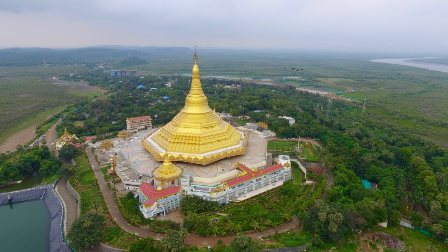Global Pagoda timings: 9.00 am to 7 pm. There is no entry fee
How to reach Global Vipassana Pagoda, Gorai / Borivali, Mumbai, India The Global Pagoda can be reached overland by car, as well by ferry. Pre-paid taxi services are available at the Mumbai domestic and international airports. Ask for "Esselworld", if "Global Vipassana Pagoda" draws a blank stare.
From Mumbai Airport:
One can drive directly to the Global Pagoda from the airport.
Driving to the Global Pagoda: Please take the Western Express Highway upto Dahisar. After crossing the Dahisar Toll Booth, take a left to the Mira-Bhayander Road. From there on, follow the road signs to Esselworld. On reaching Esselworld, please drive upto the main gate and request the security guards to guide you to the Pagoda site. Cars can also be parked at the Gorai jetty, before taking the ferry to the Global Pagoda.
This link gives more driving details on the road route to the Global Pagoda, from a recent visitor.
Hiring a car for airport pick-up to Global Pagoda:Request the taxi driver to take you to Esselworld. The approximate fare should be Rs.500 ( 7 Euros, US$ 10) to Rs 700 (10 Euros, US $14) for a non-air conditioned taxi. The approximate driving time is about 1.5 hours. Private taxis and vehicles can be hired from many car rentals in Mumbai. Rates may vary.
Many Vipassana students make use of the services of private taxi operator Mr Jagdish Maniyar. Contact : Tel (Res): 91-22-26391010 or cell phone 09869255079.e-mail:
traxtravels@hotmail.com As of November 2009, Mr Maniyar charges Rs 1,550 (approx 22 Euros, US $33) for airport pickup to Global Pagoda (inclusive of road taxes). From airport to
Dhamma Giri Vipassana centre, Igatpuri, he charges Rs 2,550 (36 Euros, US $54).
From Borivali Railway station:From Borivali Station (Western Railway, Mumbai) please use the western exit gates of the station (for the train from Churchgate, the exit is on the same platform, to the left). One can take Bus number 294 or hire an auto rickshaw (tuk-tuk) to Gorai Creek. The bus fare is Rs. 6 and auto rickshaw fare is approx Rs. 25 (approx US $0.50) to Rs 35.
For the auto-rickshaw, please take one heading to your right, after crossing the road from the western exit of the railway station. The Gorai jetty is approximately 10-15 minutes-ride from Borivili station. Please take the ferry for Esselworld from Gorai Jetty. The return fare for the ferry is Rs. 35/- per person.
On arrival at Esselworld, you will see directional boards to take you to Global Pagoda. The Dhamma Pattana Vipassana Centre is less than five minutes walking distance from the Esselworld Jetty gate.
Prefer a shorter sea trip? One can take the more frequent (and humbler) ferry to Gorai Village (Rs 5 one way - actually it's only a jetty, the village is not in visible distance). From there, shared autorickshaws (Rs 15 a seat, or Rs 40 for 3 passengers) and the more quaint horse-drawn carriages (Rs 10 a seat) are available for a nice ride to the Essel World entrance through the flat landscape of marshlands. The Global Pagoda, a brief walk from the gates, is of course visible throughout the 10-minute ride from the Gorai Village jetty.
Other Bus Numbers to GoraiFrom Kurla railway station (West) - 309 L
From Mulund station (West) - 460 L
From Ghatkopar Bus Depot - 488 L
(please re-confirm before boarding bus)
Wishing you a very happy and most beneficial visit to the Global Pagoda.
For any further details and assistance, please contact: Global Vipassana Pagoda
Telephone: 91 22 33747501 (30 lines)
Email: pr@globalpagoda.org
Pagoda Address:
Global Vipassana Pagoda
Next to Esselworld, Gorai Village,
Borivali (West), Mumbai 400091
For sending any post/courier, please use this address:
Head Office Global Vipassana Foundation
2nd Floor, Green House, Green Street, Fort
Mumbai – 400 023
Telephone: +91 22 22665926 / 22664039
Fax: +91 22 22664607
Dhamma Pattana Vipassana CentreInside Global Vipassana Pagoda Campus
Next to Esselworld, Gorai Village,
Borivali (West), Mumbai 400091
Tel: [91] (22) 3374 7519
Fax: [91] (22) 3374 7518
Email: info@pattana.dhamma.org
*
Vipassana meditation courses worldwide, course venues, online application for beginners' 10-day residential Vipassana courses* One-day Vipassana courses at Global Pagoda (for those who have completed a 10-day Vipassana course)
New website of Global Vipassana Pagoda

